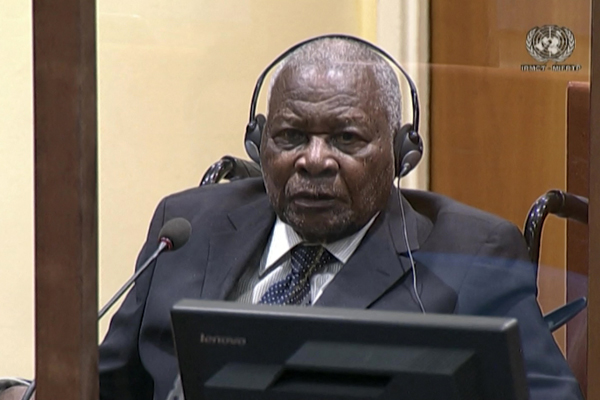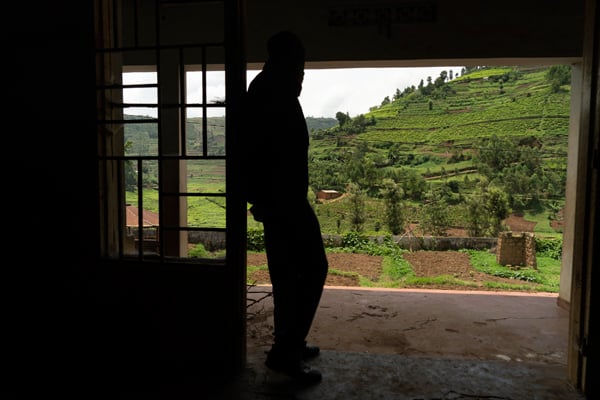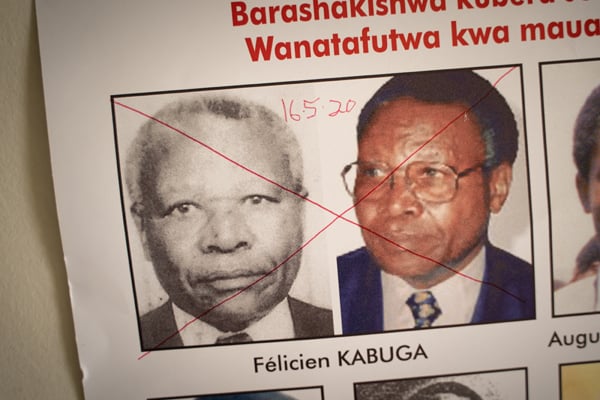Rwandan tycoon had key genocide role, trial hears

This screengrab taken from handout video footage released by The Mechanism for International Criminal Tribunals (MICT) on September 29, 2022, shows Felicien Kabuga, an alleged financier of the 1994 genocide in Rwanda, at a hearing in The Hague, on August 18, 2022, where he is facing charges of genocide and crimes against humanity. PHOTO/ AFP
Rwandan tycoon Felicien Kabuga played a crucial role in the 1994 genocide, prosecutors said Thursday as one of the most wanted remaining suspects from the slaughter boycotted the opening of his trial in The Hague.
Once among Rwanda's richest men, the now 87-year-old set up a hate broadcaster that urged ethnic Hutus to kill rival Tutsi "cockroaches" and armed the murderous Interahamwe militia with machetes, a UN tribunal heard.
The wheelchair-bound Kabuga refused to appear in court and stayed in his jail cell as the trial got underway, more than a quarter of a century after the 100-day rampage that left over 800,000 people dead.
"Twenty-eight years after the events, this trial is about holding Felicien Kabuga to account for his substantial and intentional role in that genocide," prosecutor Rashid S. Rashid told the court.
"Kabuga didn't need to wield a rifle or a machete at a roadblock, rather he supplied weapons in bulk and facilitated the training that prepared the Interahamwe to use them," he added.
"He didn't need to pick up a microphone to call for the extermination of the Tutsi on the radio, rather he founded, funded and served as president of... the radio station that broadcast genocidal propaganda across Rwanda."
After decades on the run, Kabuga was arrested in France in 2020 and sent to a UN court in The Hague.
Kabuga's lawyers entered a not guilty plea in 2020 at the UN's International Residual Mechanism for Criminal Tribunals, and have tried to halt the proceedings on health grounds.
'Frenzied calls for extermination'
The trial is being closely watched in Rwanda, which still bears the scars of the genocide.
"It is a positive sign that justice is finally going to be served," Naphtali Ahishakiye of the umbrella association for genocide survivors IBUKA told AFP.
"Kabuga's refusal to attend his trial proves that he does not want to assist truth finding in any way."
Head judge Iain Bonomy said on Thursday that Kabuga had decided not to attend the opening of the trial in person or watch by video link, but the "appropriate course is to proceed".
Kabuga issued a statement saying he had lost confidence in his own court-appointed defence attorney, Emmanuel Altit.
Prosecutors said that as a wealthy ally of Rwanda's then-ruling party, Kabuga helped create the pro-Hutu Radio-Television Libre des Mille Collines (RTLM).
As Rwanda descended into carnage after the shooting down of a plane carrying the country's Hutu president in April 1994, RTLM's spewed "constant frenzied overt calls for extermination" of Tutsis, said Rupert Elderkin, another prosecution lawyer.
The radio station described Tutsis as "cockroaches" and "subhuman vermin" and identified the hiding places of Tutsis where they were later killed, he said.
In a video played to the court, Kabuga defended the broadcaster at the time, saying it "can't please everyone".
Kabuga also directly supported the Interahamwe during the genocide, by bankrolling them, organising training, and importing machetes and other weapons.
He also allegedly handed out weapons at Interahamwe rallies. "Kabuga then told them to go and finish the job," Elderkin said.
'Significant step'
More than 50 witnesses are expected to appear for the prosecution, starting next week, in a trial that is set to take months.
After fleeing Rwanda, Kabuga spent more than 20 years evading an arrest warrant issued by the UN war crimes tribunal for Rwanda, helped by a network of former allies.
He was finally caught in a small apartment in Paris and sent to The Hague for trial.
Kabuga is one of the last Rwandan genocide suspects to face justice, with 62 convicted by the tribunal so far.
"This case is still of paramount importance," the tribunal's chief prosecutor Serge Brammertz told AFP at the court.
Four key Rwanda suspects are still at large, with the "priority" being Fulgence Kayishema, who was last located in South Africa three years ago, added Brammertz.
Human Rights Watch welcomed the start of the trial as a "significant step in efforts to ensure accountability".
But in Kabuga's native village of Nyange, many residents still speak fondly of the man who rose from humble farming stock to run an empire of coffee, tea and real estate.
"He paid us well," said Alphonsine Musengimana, 35, who worked on Kabuga's tea plantations as a child.





